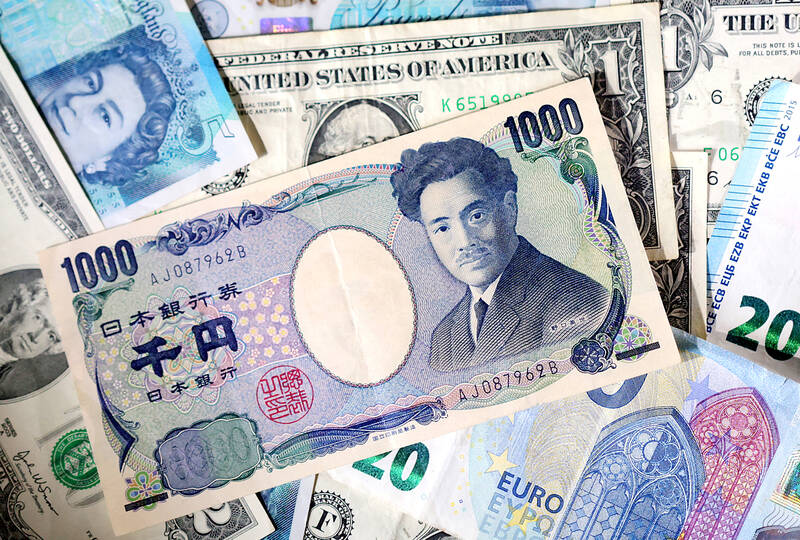Taiwan’s foreign exchange reserves slipped to US$600.197 billion at the end of last month, down US$2.746 billion from a month earlier, as the New Taiwan dollar weakened and the central bank intervened to stabilize the local currency, the central bank said yesterday.
The decline mainly reflected the depreciation of major global currencies against the US dollar and the monetary authority’s US dollar sales to support the local currency, Department of Foreign Exchange Director-General Eugene Tsai (蔡炯民) told an online news briefing.
Demand for the greenback rose amid renewed concerns over China’s rare earth export controls and escalating US-China tariff tensions, he said.

Photo: Reuters
The NT dollar fell 0.74 percent against the US dollar, prompting the central bank to step in to smooth volatility, Tsai added.
Foreign investors sold a net NT$70 billion to NT$80 billion (US$2.26 billion to US$2.58 billion) of local shares during the month, while dividend payouts from major listed firms — including Taiwan Semiconductor Manufacturing Co (台積電) — also contributed to capital outflows.
Total foreign fund outflows reached roughly US$5 billion, Tsai said.
He rejected media speculation that the monetary authority had intentionally allowed the NT dollar to weaken to help exporters, stressing that the bank follows a policy of “symmetric intervention” and only acts when market imbalances appear.
Taiwan is expected to remain on the US Department of the Treasury’s currency monitoring list in its upcoming semi-annual report, Tsai said.
The recent sell-off in local stocks reflects concerns that the US Federal Reserve might not cut interest rates next month, as a US government shutdown has complicated access to key economic data needed to guide policy expectations, he said.
Despite the outflows, foreign investors’ combined holdings of domestic equities, bonds and NT dollar-denominated deposits hit a record US$1.15 trillion last month — equivalent to 192 percent of Taiwan’s foreign exchange reserves — buoyed by earlier stock market gains, Tsai added.
The recent capital outflows appeared to reflect normal market activity, Tsai said, adding that he has not detected any irregularity.

RUN IT BACK: A succesful first project working with hyperscalers to design chips encouraged MediaTek to start a second project, aiming to hit stride in 2028 MediaTek Inc (聯發科), the world’s biggest smartphone chip supplier, yesterday said it is engaging a second hyperscaler to help design artificial intelligence (AI) accelerators used in data centers following a similar project expected to generate revenue streams soon. The first AI accelerator project is to bring in US$1 billion revenue next year and several billion US dollars more in 2027, MediaTek chief executive officer Rick Tsai (蔡力行) told a virtual investor conference yesterday. The second AI accelerator project is expected to contribute to revenue beginning in 2028, Tsai said. MediaTek yesterday raised its revenue forecast for the global AI accelerator used

TEMPORARY TRUCE: China has made concessions to ease rare earth trade controls, among others, while Washington holds fire on a 100% tariff on all Chinese goods China is effectively suspending implementation of additional export controls on rare earth metals and terminating investigations targeting US companies in the semiconductor supply chain, the White House announced. The White House on Saturday issued a fact sheet outlining some details of the trade pact agreed to earlier in the week by US President Donald Trump and Chinese President Xi Jinping (習近平) that aimed to ease tensions between the world’s two largest economies. Under the deal, China is to issue general licenses valid for exports of rare earths, gallium, germanium, antimony and graphite “for the benefit of US end users and their suppliers

Dutch chipmaker Nexperia BV’s China unit yesterday said that it had established sufficient inventories of finished goods and works-in-progress, and that its supply chain remained secure and stable after its parent halted wafer supplies. The Dutch company suspended supplies of wafers to its Chinese assembly plant a week ago, calling it “a direct consequence of the local management’s recent failure to comply with the agreed contractual payment terms,” Reuters reported on Friday last week. Its China unit called Nexperia’s suspension “unilateral” and “extremely irresponsible,” adding that the Dutch parent’s claim about contractual payment was “misleading and highly deceptive,” according to a statement

Artificial intelligence (AI) giant Nvidia Corp’s most advanced chips would be reserved for US companies and kept out of China and other countries, US President Donald Trump said. During an interview that aired on Sunday on CBS’ 60 Minutes program and in comments to reporters aboard Air Force One, Trump said only US customers should have access to the top-end Blackwell chips offered by Nvidia, the world’s most valuable company by market capitalization. “The most advanced, we will not let anybody have them other than the United States,” he told CBS, echoing remarks made earlier to reporters as he returned to Washington